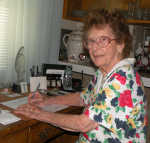98-year-old has seen it all through the years

LORRI SUGHROUE
McCook Daily Gazette
CULBERTSON, Nebraska -- With more than half the U.S. now estimated to be in some form of drought, June (Lorimor) Kern, 98, of Culbertson, has already been there, done that during the Great Depression in the 1930s.
Growing up in Iowa, the oldest of seven children, she remembers the red powder from Oklahoma floating in the air with the dust storms. She and her mother would wrap wet strips of cloth around window sills and doorways, but still every morning, there was a layer of dust everywhere, she remembers.
Later, when she was teaching school, several times parents came to pick up their children in the middle of the day, not knowing what to expect with the dust clouds on the horizon.
And a sluggish economy is nothing new to her, either. The June 2012 unemployment at 8.2 percent is nothing compared to the 25 percent rate during the Depression.
"We were hard-up, but everyone was back then," she recalled. "We fished, we hunted, we played board games, anything that didn't cost money."
Unlike many girls in the early 1930s, Kern steered clear of marriage and headed for Peru Teachers College to become a teacher.
While there, she coached the girls county basketball team to the state championships.
Looking at a photo of the team, with blouses primly tucked into the shorts, she remarked, "We were pretty good, but those uniforms do look a little funny now."
After graduation, she taught county school in Iowa, then on the advice of a friend, headed for Culbertson for a fourth grade teaching position.
After teaching here for a few years, she had to pack it in and return to Iowa when her mother died, to take care of her father and little brother.
But Nebraska had found a way into her heart, in the form of Everett Kern. She later married him and returned to Culbertson, where they raised three children. She still lives in Culbertson today in a modest, well-kept house.
Now with a little time on her hands, she keeps busy with the Happy Hour Club, where she and friends meet once a week to "solve all the world's problems and lie to each other," she laughed. "We have about two drinks each, we're not big drinkers. But we do like to eat."
She also likes to makes afghans and cook. And no need of a computer for her: Kern likes to write her letters by hand at her desk.
She tried to live in Arizona near her son, but missed her friends in Nebraska. "They can have Arizona. I can take a little snow as long as my furnace works," she said.
Kern is one of many senior citizens in Southwest Nebraska who live near or over the century mark. For herself, Kern credits good friends. good genes and seeing the glass half-full.
"I honestly haven't done anything special," she asserted. "I worked hard and played hard, had a lot of good friends and enjoyed life every step of the way. I've had my share of sad things happening, but everyone has. I just try to see the good in everything."
Had luck with horses but not women
While teaching in Culbertson during the Depression, two boys, ages 14 and 16, were brought into Kern's classroom one day by the superintendent. Authorities found Steve and Fred Brooks living with their family in a covered wagon on the fairgrounds. The boys were brought to school and placed in Kern's fourth grade class. Neither one could read or write but they drew pictures of horses on every paper they turned in, she recalled.
Ed Orion of Culbertson, who bred and trained horses south of town, introduced Steve to racehorses and Steve later left school to pursue life on the race horse circuit. He became the leading jockey in 1949, winning the Kentucky Derby that year. Steve went on to win numerous races, was named a Hall of Fame jockey and garnered millions of dollars.
Through the years, Kern thought she had seen the last of Steve. But a few years ago, someone came to the house to trim trees for Kern, and she found out he was a cousin of Steve's.
After asking about her former student, the relative told her that although Steve a winner at picking horses, he was not good with money or picking his women.
Still, he must have had a charismatic personality. "He was very popular with the kids in school," she remembered.
Steve is buried in the Culbertson cemetery, with a horse on the gravestone, she believes.
To read more about Brooks, go to Walt Sehnert's column at www.mccookgazette.com/story/1061142.html
